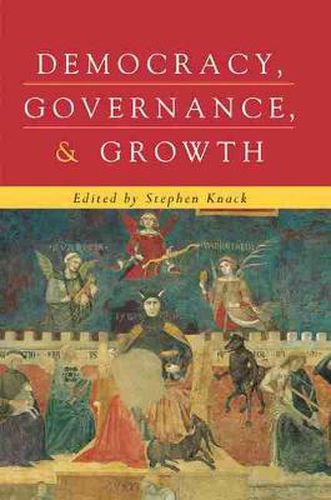Readings Newsletter
Become a Readings Member to make your shopping experience even easier.
Sign in or sign up for free!
You’re not far away from qualifying for FREE standard shipping within Australia
You’ve qualified for FREE standard shipping within Australia
The cart is loading…






For many decades, underdevelopment in much of the world was blamed variously on capital deficits, exploitation by rich nations, and market-distorting economic policies. The chapters in this volume provide much of the evidence underpinning a growing consensus among development and growth economists that successful economic development depends more fundamentally on the way societies are organized and governed. They argue that good governance is a prerequisite to sustained increases in living standards.
The difference between developmental success and failure in this view has little to do with natural resource availability, climate, aid, or developed nations’ policies. Rather, it is largely a function of whether incentives within a given society steer wealth-maximizing individuals toward producing new wealth or toward diverting it from others. The chapters, seminal essays written by Mancur Olson and his IRIS Center colleagues, provide theoretical and/or empirical underpinnings for the emerging consensus that differences in the way governments and societies are organized have enormous implications for the structure of incentives faced by politicians, bureaucrats, investors, and workers, which in turn determines the level of a nation’s material well-being.
Overall this volume applies tools and concepts from the New Institutional Economics to some of the major issues in economic development. It will be of interest to scholars and students of various disciplines-including political science, law, and sociology as well as economics-interested in the determinants of economic development and global economic change. The book will also be of interest to many aid practitioners, particularly those working in anticorruption and public sector reform issues.
$9.00 standard shipping within Australia
FREE standard shipping within Australia for orders over $100.00
Express & International shipping calculated at checkout
For many decades, underdevelopment in much of the world was blamed variously on capital deficits, exploitation by rich nations, and market-distorting economic policies. The chapters in this volume provide much of the evidence underpinning a growing consensus among development and growth economists that successful economic development depends more fundamentally on the way societies are organized and governed. They argue that good governance is a prerequisite to sustained increases in living standards.
The difference between developmental success and failure in this view has little to do with natural resource availability, climate, aid, or developed nations’ policies. Rather, it is largely a function of whether incentives within a given society steer wealth-maximizing individuals toward producing new wealth or toward diverting it from others. The chapters, seminal essays written by Mancur Olson and his IRIS Center colleagues, provide theoretical and/or empirical underpinnings for the emerging consensus that differences in the way governments and societies are organized have enormous implications for the structure of incentives faced by politicians, bureaucrats, investors, and workers, which in turn determines the level of a nation’s material well-being.
Overall this volume applies tools and concepts from the New Institutional Economics to some of the major issues in economic development. It will be of interest to scholars and students of various disciplines-including political science, law, and sociology as well as economics-interested in the determinants of economic development and global economic change. The book will also be of interest to many aid practitioners, particularly those working in anticorruption and public sector reform issues.